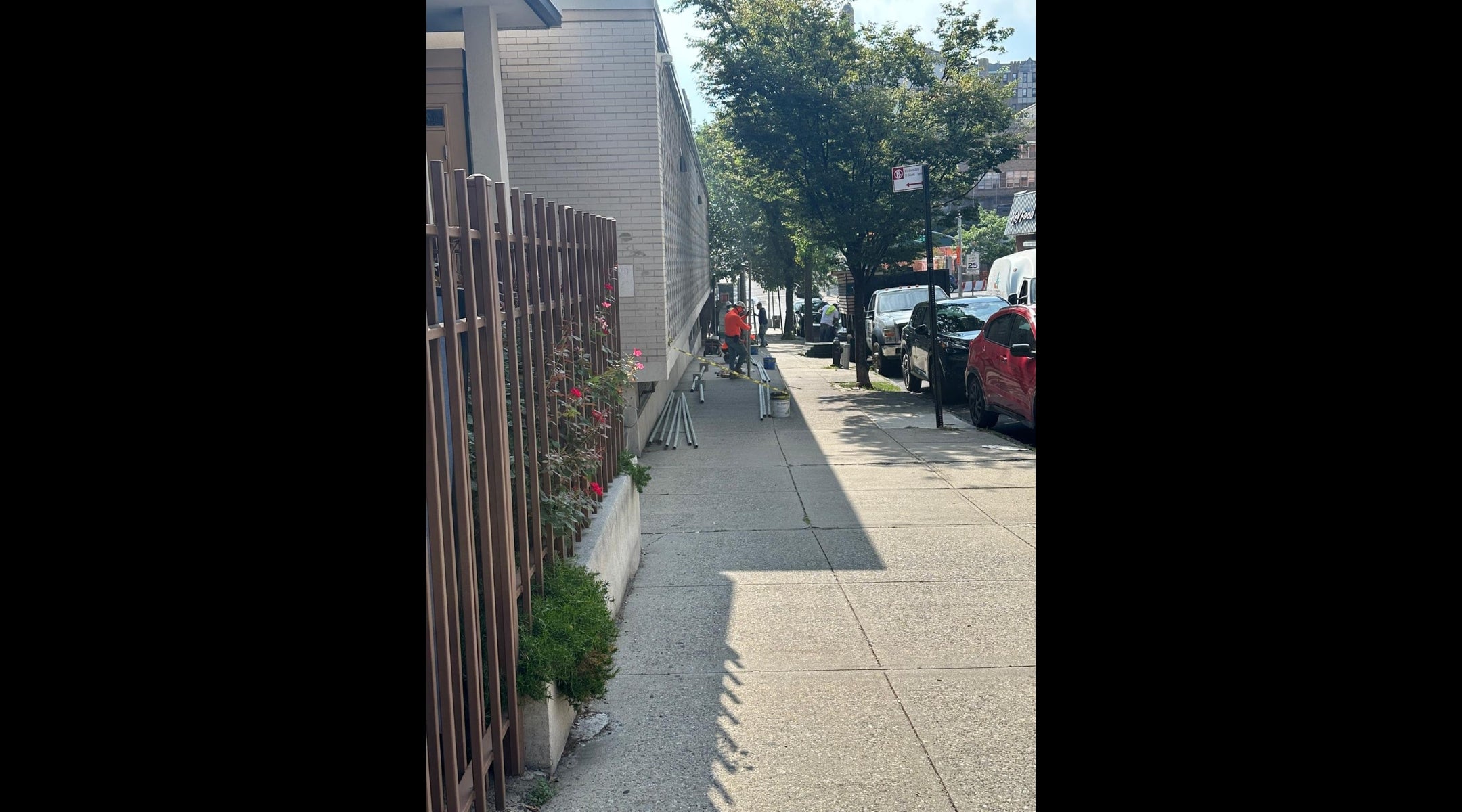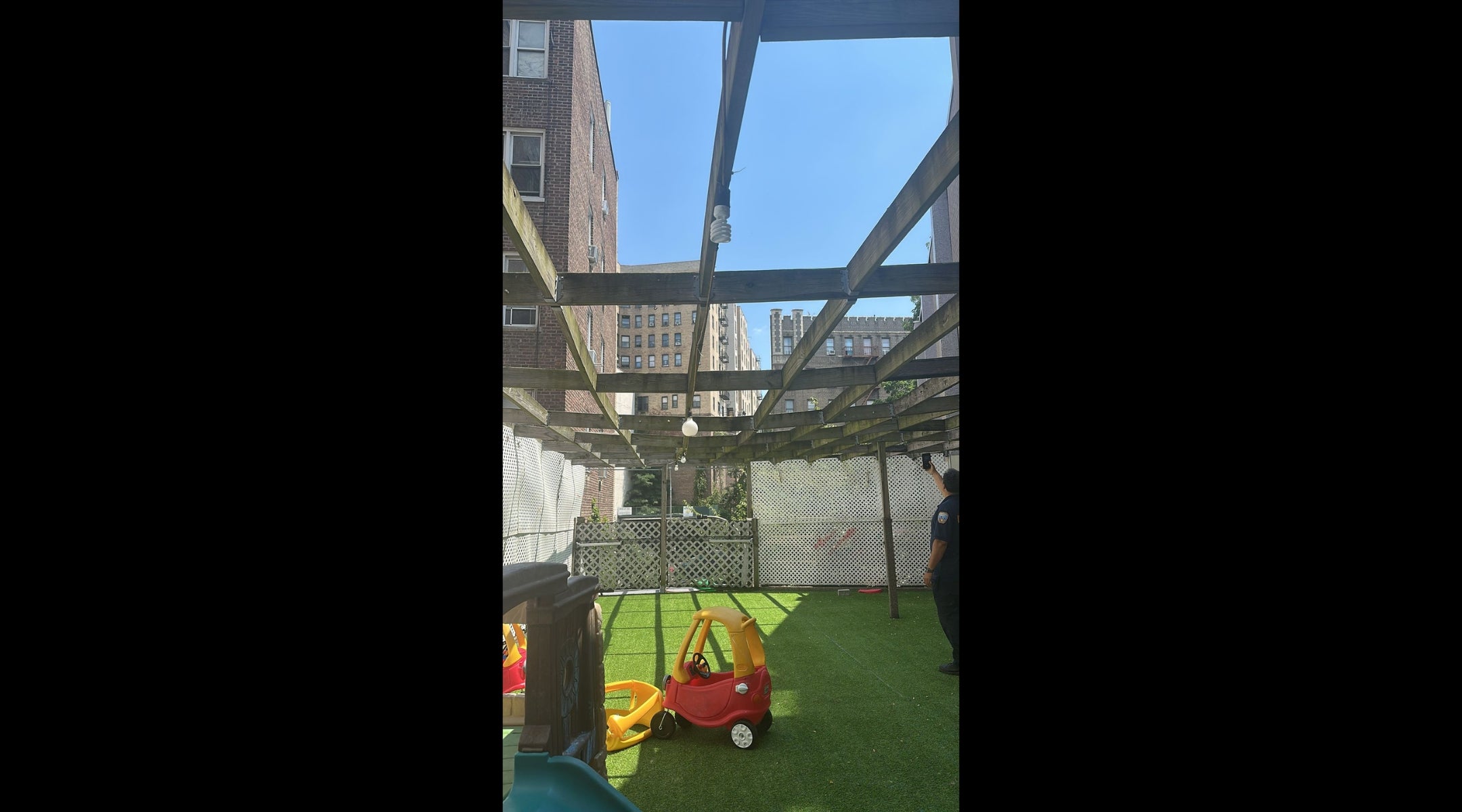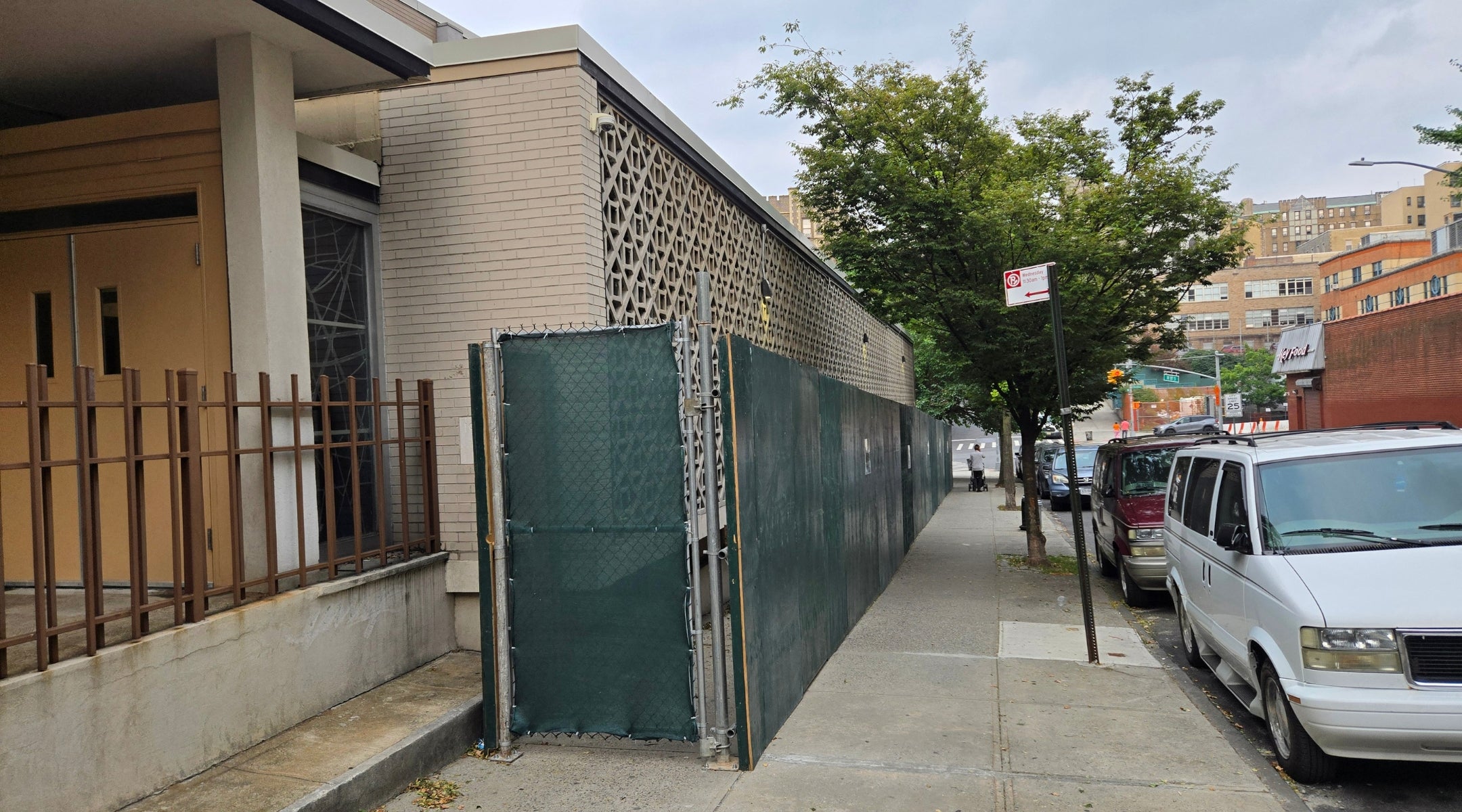Riva Preil moved out of Washington Heights in 2019. A physical therapist with her own practice who now lives on the Upper West Side, Preil was sad to hear that her former synagogue, Mt. Sinai Jewish Center, faces possibly hundreds of thousands of dollars of unexpected necessary repairs, following a surprise inspection from the city’s Department of Buildings.
During its visit last month, which was undertaken due to construction next door, the DOB found multiple unsafe conditions and issued a partial vacate order, prohibiting entry to the playground, which is located in the synagogue’s courtyard. The congregation was also ordered to put up multiple sidewalk sheds and fencing, each costing upwards of $20,000.
In response, 270 donors so far — including Preil, who contributed $360 — have donated to a fund to assist the Modern Orthodox synagogue.
“I loved the community, made many friends there,” Preil told the New York Jewish Week. “When I found out that they were in trouble, I wanted to help in whatever way I could.”
Located at 135 Bennett Avenue on 187th Street, the Mt. Sinai Jewish Center serves roughly 200 congregants. It is the latest New York City Jewish congregation to abruptly face questions about its future. Earlier in July, an independent minyan on the Upper West Side unexpectedly lost its prayer space when the school that hosted it declared bankruptcy.
“There’s no question this is going to be over $100,000,” Mt. Sinai president Caleb Fischer said of the required repairs, adding that the congregation has a “fairly modest” budget. “It could go up to $200,000. Until we get final quotes, it’s hard to say exactly, which makes this all the more stressful. We’re just facing such an uncertain financial future.”
Describing the “unsafe conditions” at Mt. Sinai, the DOB told the New York Jewish Week in an emailed statement July 29 that they discovered “that pieces of concrete, tile and glass had deteriorated into disrepair, and some had already fallen off the side of the building.”
Photos provided by the department taken three weeks ago show broken exterior plexiglass over the synagogue’s stained glass windows, which were designed by French-born American artist Jean-Jacques Duval. The photos also show exposed rebar and loose facade tiles on the building, which was built in 1959.
“Since our initial inspection last week, we have been in near daily conversation with the owners of the center, guiding them on the steps they need to take to protect the public, and to help ensure that the building can still be safely occupied without posing a danger to members of the community,” the DOB wrote. “We are committed to enforcing the city’s construction codes in an equitable manner to promote public safety in every neighborhood across the city.”

A new fence is installed along the public-facing wall of Mt. Sinai Jewish Center. (Courtesy Caleb Fischer)
As of Monday, July 28, the loose mosaic tiles facing the courtyard have been removed; as of July 25, a fence along West 187th Street has been installed. The synagogue and DOB have been able to negotiate on the fence’s height requirements from 12 ft. to 8 ft., lowering the cost of the fence for the synagogue while still protecting the public from deteriorating concrete along the facade of the building, both the DOB and Fischer confirmed.
Fischer sent an email to the community on July 25, following DOB inspectors’ second visit, explaining the financial situation, and attaching a donation form at the bottom. Mt. Sinai Jewish Center employees and members, past and present, have donated about $66,000 so far.
“I was very touched by our community,” Mirasha Moore, executive director of the synagogue, said.
Nonetheless, the congregation still has a steep hill to climb. Moore has pivoted her summer workload away from running the synagogue’s summer camp and daycare to searching for contractors for the shed installation, fencing and repairs.
“Luckily, I hired someone to be like a co-director for summer, because this literally took up all my daytime but also nighttime,” Moore said.
Moore has spent the past few weeks shopping around for contractors, at times working with 24-hour deadlines to prevent the city from stepping in with their own contractors, at two or three times the price of what a private contractor might offer.
“I was getting quotes literally anywhere from $10,000 to $27,000 for the exact same project, just for the sidewalk shed,” she said, referring to the component of scaffolding that includes what is often a green wooden covering, to protect pedestrians from falling debris. “I said this to the city, ‘You guys have people on your Rolodex to be able to call to do these things. We don’t.’ I don’t have a sidewalk shed person, I don’t have a gate person. I don’t have a contractor on speed dial.”
The timing of the initial DOB inspection added another layer of stress: It happened in late July, just before the start of the Nine Days, the escalated period of mourning ahead of Tisha B’Av. It’s a time of introspection and mourning rituals, remembering the destruction of the Temples in Jerusalem and other historical calamities. During the Nine Days, under Jewish law, it is forbidden to expand or remodel a home and it is discouraged to get involved in a court case unless truly unavoidable.
“We are being reminded with painful clarity just how fragile our communal spaces can be and how urgent it is for us to come together in their defense,” Fischer’s letter to the community read. “That we have been blindsided by the DOB without a semblance of leniency or understanding and summoned to court by the City of New York during a time when our tradition teaches us to refrain from engaging in legal disputes or court proceedings, feels not only disrespectful, but deeply out of step with both the legal accommodation of religious minorities and the spirit of compassion we hope to see from our civic institutions in these troubled times.”
Adding some extra tension to the situation, a court date with the DOB has been scheduled for Oct. 1 — Yom Kippur.
While the symbolism is apparent, Fischer and others do not think the synagogue is being singled out in an act of antisemitism. (That October court date, which was scheduled for all DOB inspections made July 25, can be changed online, the DOB told the New York Jewish Week.)
Nonetheless, the DOB inspection results could interrupt more Jewish holiday observances in the near future.
On July 25, when DOB inspectors returned to take more photos and measurements, they delivered another whammy to the synagogue: The year-round base of the sukkah structure, which had been up for 15 years, had to be removed. And the courtyard, which also serves as a playground, is now totally off-limits for safety reasons.

A year-round sukkah structure at Mt. Sinai Jewish Center was ordered to be taken down by the Department of Buildings. (Courtesy Caleb Fischer)
Looking ahead, the synagogue hopes to pay for the repairs at a fair price, and get past this tenuous moment.
In the meantime, the congregation is continuing their fundraising efforts. “Let’s show the city that Mt. Sinai Jewish Center is not just a building,” Fischer wrote. “We are a resilient, committed, and unified community.”
The New York Jewish Week brings you the stories behind the headlines, keeping you connected to Jewish life in New York. Help sustain the reporting you trust by donating today.





